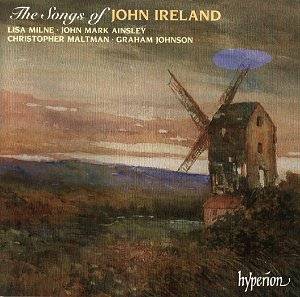
Let me admit at the outset: John Ireland is my favourite composer; he has
been for over twenty years, and his solo songs contain some of the best of
him. Therefore, a new release of 68 of his 85 songs is very welcome, although
one would not wish to be without the three Lyrita LPs issued in 1975/9, nor
the very attractive Etcetera CD by Rachel Ann Morgan and Tan Crone (KTC 1128
of 1992). The fact that so many of Ireland's greatest songs are missing from
the new Hyperion set is a matter of much regret. For example, of the superb
Housman cycle "The Land of Lost Content", only one of the six songs ("Ladslove")
is included; and the wonderful "Youth's Spring Tribute" from "Marigold" (1913)
is also much missed. There should, too, have been room for the two powerful
Rupert Brooke settings. True, the discs are very generously filled (76 1/2
mins. and 77 mins. respectively), but the editorial policy about what to
include and what to exclude is not easy to fathom. For example, the newly
discovered "When I am old", being unpublished and hitherto obscure, hardly
merits a place when a cheerful song like "East Riding" or "The Merry Month
of May" would have made for a better balanced programme. Furthermore, the
"Mother and Child" settings, though of considerable charm and beautifully
sung, are hardly masterpieces compared with "The Lent Lily", "The Vain Desire"
or "Epilogue" from the Housman cycle mentioned earlier.
Perhaps if the new collection sells well (and it deserves to) Hyperion will
be able to issue a further disc bringing the 18 songs left out this time
into the public eye once more. A song composer of the stature of John Ireland
really deserves to have the full canon of his music available on record:
after all, his complete piano, chamber, organ and orchestral works are in
the catalogue, as indeed they should be. The most striking points about Ireland's
songs may be said to be their depth of emotional feeling; the memorability
of their melodies: the resourcefulness and beauty of the piano accompaniments;
and the extraordinary genius which Ireland possessed for creating exactly
the right atmosphere and mood for the words he chose to set. The liner booklet
notes, by Andrew Green, are splendid. Immensely readable and friendly, yet
underlaid by a deep knowledge and obvious affection for his subject, Mr.
Green's very extensive essay and programme notes are outstandingly excellent,
even by the standards we have come to anticipate from Hyperion. Few composers
can have had such sensitive, insightful, funny and moving things written
about their most personal works.
Any music is only as good as its performance, and to appreciate these intensely
felt songs to the full, a very high degree of vocal and pianistic talent
is vital. Because the piano parts are such an integral part of the whole
conception, it is disappointing to hear how backwardly balanced the piano
often sounds, and how frequently essential details and colours in the harmonies
are lost owing to the pianist's tendency to emphasise the treble part melody
for much of the time. There are, too, a regrettable and, indeed, remarkable
number of mistakes in the piano parts, most notably in the piano solo "Spring
will not wait" (II band 36) and in the approach to the climax in "Tryst (In
Fountain Court)" (I band 8). Note also the obviously misread chord at the
end of "We'll to the woods no more" (II band 34) : an artist of the eminence
of Graham Johnson and a production team of the stature of Hyperion's simply
ought not to have allowed these through. For anyone who knows this repertoire,
there will be a fair few occasions when you will be jerked out of your seat
by some wrong note or chord. That being said, Mr. Johnson has a beautiful
touch and exquisite style, although as I have observed the playing is often
over-reticent and significant nuances are lost.
Of the three singers, I have no hesitation in saying that Lisa Milne is the
most pleasing. She produces a lovely tone and her emotional involvement is
just at the right level. This repertoire does not call for wildly dramatic,
quasi-operatic singing, any more than it needs the cool classicism appropriate
for Haydn and Mozart. Christopher Maltman tends to produce a less attractive
tone-colour and excessive vibrato when the volume or pitch is pushed hard
and high, but he is often very moving, despite some idiosyncratic diction.
John Mark Ainsley is always worth hearing, though I think some may feel that
he has been in better voice elsewhere. Words and intonation of all three
singers are good.
I would have wished to give an unequivocal "three cheers" for this project,
but can manage two at the most. Nevertheless, this is an extremely important
new release, and merits a place in the collection of any British music
enthusiast.
Reviewer
Paul Edwards

See also review by Gerald Fenech
